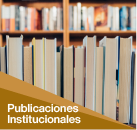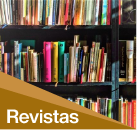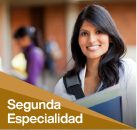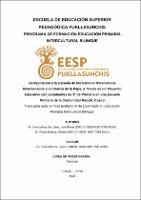Mostrar el registro sencillo del ítem
Incorporación a la Escuela de los Saberes Matemáticos Relacionados a la Crianza de la Papa, a Través de un Proyecto Educativo con Estudiantes de 3° de Primaria en una Escuela Primaria de la Comunidad Racchi, Cusco
| dc.contributor.advisor | Ríos Mencía, Jesús | |
| dc.contributor.author | Oraccahua Gonzales, Joel Bimar | es_PE |
| dc.contributor.author | Puma Huillca, Moises | es_PE |
| dc.date.accessioned | 2025-06-02T03:40:57Z | |
| dc.date.available | 2025-06-02T03:40:57Z | |
| dc.date.issued | 2024-04-24 | |
| dc.identifier.uri | http://repositorio.pukllasunchis.org/xmlui/handle/PUK/129 | |
| dc.description.abstract | El presente trabajo de investigación incorpora saberes matemáticos relacionados a la crianza de la papa y proceso de aprendizaje de los niños y niñas del tercer grado de primaria de una escuela rural en la Región Cusco.. Con esta finalidad, nuestra tesis utiliza un diseño descriptivo aplicando instrumentos cualitativos. Recogimos testimonios de madres, padres de familia y sabios de la comunidad con el propósito de que puedan compartirnos sus saberes y así poder aplicar un proyecto de aprendizaje para fortalecerlos y establecer un diálogo con otras medidas formales El proyecto de aprendizaje abarca cuatro cursos, donde tres de ellos surgen desde la crianza de la papa y, el cuarto, desde la sesión del número áureo, (número que podemos encontrar en la naturaleza y que nos interesa que los niños y niñas aprecien). Este número es un modo de acercar la naturaleza a la matemática universal, no como una matemática opuesta, ni con mayor validez, sino más bien como aquella que muestra la importancia primigenia de las matemáticas dentro de la apreciación de la naturaleza así por ejemplo: la papa es parte de la naturaleza, los tallos y todo el cuerpo, tiene una forma, una belleza y una simetría donde podemos reconocer el número áureo. La conclusión de este trabajo está en relación a la incorporación de saberes matemáticos sobre la crianza de la papa y la apreciación de la naturaleza, desde el número áureo. En las sesiones de aprendizaje se mostrará además la efectividad o inefectividad de llevar las prácticas comunales a la escuela, mediante una experiencia de aprendizaje. Ahí reside la importancia de esta tesis, llevar las potencialidades pedagógicas de nuestros pueblos. | es_PE |
| dc.description.abstract | Abstract The present research work incorporates mathematical knowledge related to potato raising to the learning process of boys and girls in the third grade of primary school in a rural school in the Cusco Region. For this purpose, our thesis uses a descriptive design applying qualitative instruments. We collected testimonies from mothers, fathers and wise people from the community so that they could share their knowledge with us and thus be able to apply a learning project to strengthen them and establish a dialogue with other formal measures. The learning project covers four courses, where three of them arise from the raising of potatoes and, the fourth, from the session of the golden number, a number that we can find in nature and that we are interested in boys and girls appreciating. This number is a way of bringing nature closer to universal mathematics, not as an opposite mathematics, nor with greater validity, but rather as one that shows the primordial importance of mathematics within the appreciation of nature, for example: Potato is part of nature, the stems and the entire body, it has a shape, a beauty and a symmetry where we can recognize the golden ratio. The conclusion of this work is related to the incorporation of mathematical knowledge about potato breeding and the appreciation of nature, from the golden ratio. The learning sessions will also show the effectiveness or ineffectiveness of bringing communal practices to school, through a learning experience. Therein lies the importance of this thesis, bringing the pedagogical potential of our people. Keywords: Intercultural Mathematics, Bilingual Intercultural Primary Education, Raising or Cultivation of the Potato, Quechua Mathematical Concepts. | es_PE |
| dc.description.abstract | Pisi rimarillaypi Kay llamk’ay k’uskimusqaykuqa sutinmi imaynatan yupaykunaq kawsaynista mat´ipanapaq papa uywayninchis ukhumanta. Chaypaqmi diseño descriptivo nisqawan instrumentos cualitativos nisqawan yanapachikurqayku, chayraykum tayta mamakunamanta, llaqtapi yachaqkunamantapas yachaqchuna rimayninta huñurqayku, chaywanmi yachayninkuta ñuqaykuwan rakinakunankupaq, chaynallataq proyecto de aprendizaje nisqawan ruwayta atinankupaq. Kay llamkaypa tukupayninqa, yachaykunapi tayta mama uywaywan yupay yachaykunata mana churasqanwanmi tupan. Yachachiqkuna matemáticas nisqapi pisilla sut’i kayta rikuchinku, mana yachayniyuq kasqankurayku. Chanin rimaykuna: maskayqa tukupaypiqa papa mirachiywanmi llapa yupay yachaykunata churanapaq yuyaychakun. | es_PE |
| dc.format | application/pdf | es_PE |
| dc.language.iso | spa | es_PE |
| dc.publisher | Asociación Pukllasunchis | es_PE |
| dc.rights | info:eu-repo/semantics/openAccess | es_PE |
| dc.rights.uri | https://creativecommons.org/licenses/by-nc-sa/4.0/ | es_PE |
| dc.subject | Educación Intercultural Bilingüe | es_PE |
| dc.subject | Matemática intercultural | es_PE |
| dc.subject | Conceptos Matemáticos Quechuas | es_PE |
| dc.title | Incorporación a la Escuela de los Saberes Matemáticos Relacionados a la Crianza de la Papa, a Través de un Proyecto Educativo con Estudiantes de 3° de Primaria en una Escuela Primaria de la Comunidad Racchi, Cusco | es_PE |
| dc.type | info:eu-repo/semantics/bachelorThesis | es_PE |
| dc.type.version | info:eu-repo/semantics/publishedVersion | es_PE |
| dc.publisher.country | PE | es_PE |
| dc.subject.ocde | https://purl.org/pe-repo/ocde/ford#5.03.01 | es_PE |
| renati.advisor.orcid | https://orcid.org/0009-0003-7641-2685 | es_PE |
| renati.type | https://purl.org/pe-repo/renati/type#tesis | es_PE |
| renati.level | https://purl.org/pe-repo/renati/nivel#tituloProfesional | es_PE |
| renati.discipline | 112096 | es_PE |
| renati.juror | Eguiluz Duffy, Cecilia María | es_PE |
| renati.juror | Suárez Sánchez, Richard | es_PE |
| renati.juror | Conde Marquina, Antonieta | es_PE |
| thesis.degree.name | Licenciado en Educación Primaria Intercultural Bilingüe | es_PE |
| thesis.degree.discipline | Educación Primaria Intercultural Bilingüe | es_PE |
| thesis.degree.grantor | Escuela de Educación Superior Pedagógica Privada Pukllasunchis | es_PE |
| renati.author.dni | 75991049 | |
| renati.author.dni | 74172501 | |
| renati.advisor.dni | 23953895 |







